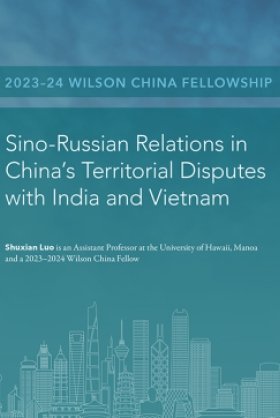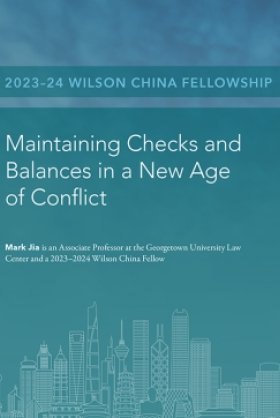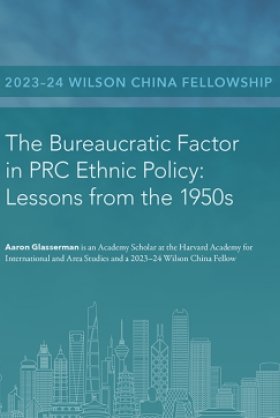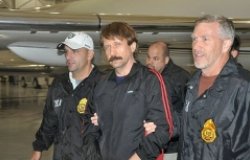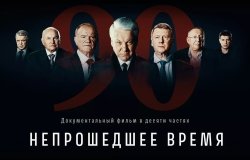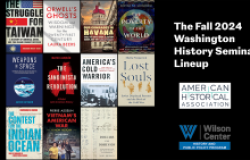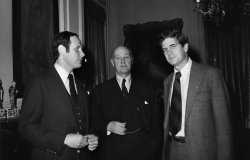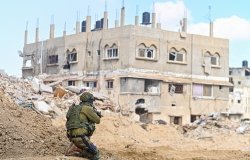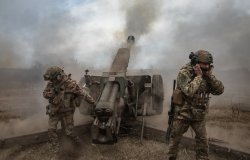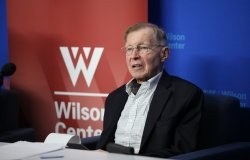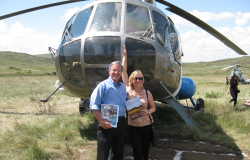Creating and Challenging the Transatlantic Intelligence Community
Transatlantic intelligence cooperation played a key role in collecting and analyzing information during the Cold War, and the resulting intelligence product informed the decision-making process at the highest levels of government in Europe as well as in the United States. The need for intelligence cooperation has become even more urgent after 9/11, as nations on both sides of the Atlantic are facing terrorist threats, and are confronting a host of other challenges posed by non-state actors, such as arms and drug trafficking as well as organized crime.
Overview
Transatlantic intelligence cooperation played a key role in collecting and analyzing information during the Cold War, and the resulting intelligence product informed the decision-making process at the highest levels of government in Europe as well as in the United States. The need for intelligence cooperation has become even more urgent after 9/11, as nations on both sides of the Atlantic are facing terrorist threats, and are confronting a host of other challenges posed by non-state actors, such as arms and drug trafficking as well as organized crime.
The Woodrow Wilson Center, the German Historical Institute, and the International Intelligence History Association are delighted to invite you to the jointly organized conference on "Creating and Challenging the Transatlantic Intelligence Community." For further information and to register, please contact the IIHA Executive Director by email at exec_director@intelligence-history.org.
THURSDAY, 30 March 2017 (Woodrow Wilson Center) 12:00-12:30 Registration 12:30-13:00 Welcome and Opening
- Christian OSTERMANN (Director, Woodrow Wilson Center, USA)
- Thomas BOGHARDT (U.S. Army Center of Military History, USA)
- Michael WALA (Ruhr-University Bochum, Germany/IIHA)
13:00 - 14:00 Panel I: From World War to Cold War and BeyondChair: Anna DAUN (Berlin School of Economics and Law, Germany)• Thomas J. MAGUIRE (King’s College London, UK):"Western Overseas Security Assistance: Counter-Subversion, Intelligence Liaison and Post-Imperial Influence in the Cold War Global South”• Michael HERMAN (Nuffield College Oxford, UK):“What Difference did it Make? Cold War Intelligence from Todays’ Point of View”14:00 - 14:30 Coffee Break 14:30 - 16:00 Panel II: Exchanging Intelligence, Exchanging DataChair: Vince HOUGHTON (International Spy Museum, USA)• John FOX (FBI Historian, USA):“Foreign Counterintelligence Cooperation and the Transatlantic Intelligence Community”• Jens WEGENER (William Paterson University, USA):“A Many-Headed Beast: The CIA’s Project HYDRA and the Dawn of the Information Age in the Transatlantic Intelligence Cooperation”• Verena DIERSCH (University of Cologne, Germany):“Digital Network Intelligence in a Transatlantic Organizational Field and Cooperation between NSA, BND, and BfV” 16:00 - 16:30 Coffee Break 16:30 - 18:00 Panel III: Transatlantic Intelligence and Eastern EuropeChair: Jeffrey HERF (University of Maryland, USA)• Mark STOUT, Katalin KADAR LYNN (Johns Hopkins University, USA):“Failed Transatlantic Liaison: Early Cold War Paper Mills and the Case of the MHBK (Association of Hungarian Veterans)”• Enrico HEITZER (Brandenburg Memorial Foundation, Germany):“The Fighting Group against Inhumanity: Spying and Destabilizing the GDR”• Nicholas J. SCHLOSSER (US Army Center of Military History, USA):“The East German Campaign against Radio in the American Sector (RIAS) Berlin, 1953-1961” FRIDAY, 31 March 2016 (Woodrow Wilson Center)9:00 - 10:30 Young Researchers’ Forum IChair: Charlotte Backerra (University of Stuttgart, Germany)• Susan PERLMAN (American University Washington DC, USA):“Franco-American Intelligence Cooperation and the Beginning of the Global Cold War”• Constant HIJZEN (Leiden University, The Netherlands):“Our American Friends: The Genesis of the Dutch-American Intelligence Liaison” 9:00 - 10:30 Young Researchers’ Forum IIChair: Anna Abelmann (Ruhr-University of Bochum, Germany)• Christopher KIRCHBERG (Ruhr-University Bochum, Germany):“NADIS: A starting point for a new level of transatlantic intelligence Partnership?”• Tobias SCHMITT (University of Freiburg, Germany):“U.S. Intelligence and the nascent transatlantic security architecture of the Cold War: The Case of the Gesellschaft für Wehrkunde”• Daniel PRONK (Netherlands Ministry of Defense, The Netherlands):“Sharing the Burden, Sharing the Secrets. The Fulcrum of Transatlantic Intelligence Cooperation” 10:30 - 10:45 Coffee Break 10:45 – 11:45 Panel IV: Dealing with Two GermanysChair: Richard BREITMAN (American University, USA)• Kevin Conley RUFFNER (CIA, USA):“‘Our Work in the Soviet Zone of Germany has been nothing but InterminableDelays, Restrictions, Bargaining and Suspicion’: U.S. Army Graves Registration Operations in East Germany 1945-1956”• Kristie MACRAKIS (Georgia Institute of Technology, USA):“The Hazards of Intelligence Cooperation: The Case of the Berlin Tunnel & George Blake” 12:00-13:00 Keynote AddressChair: Christian OSTERMANN (Woodrow Wilson Center, USA)• Christopher A. KOJM (George Washington University, formerly chair ofNIC, USA): “Transatlantic Intelligence Relations” 13:00-14:30 Lunch Break 14:30 - 16:00 Panel V: Anglo-American Signals Intelligence Relationship: Evolution and LessonsChair: John FERRIS (University of Calgary, Canada)• David J. SHERMAN (National Security Agency, USA):“From Improvisation to Permanence: British and American Signals Intelligence, 1941-1955: An US-American Perspective”• Tony COMER (Government Communications Headquarters, UK):“From Improvisation to Permanence: British and American Signals Intelligence, 1941-1955 – a British Perspective”• Michael WARNER (US Department of Defense, USA):“Transformation and Intelligence Liaison” 16:00-16:30 Coffee Break 16:30-18:00 Panel VI: UK-USA Intelligence: Past, Present, FutureChair: Bernd SCHAEFER (Woodrow Wilson Center, USA)• Chris MORAN (University of Warwick, UK):“Anglo-American Co-operation and the Future of Intelligence”• David GIOE (US Military Academy at West Point, USA):“The 1946 UK-USA Agreement: The Mustard Seed of Transatlantic Cyber Operations?”• Calder WALTON (Harvard University, USA):“For your Eyes only: The UK-US ‘Special’ Intelligence Relationship and Changing Strategic Threats in the Twentieth Century” 18:15-19:15 Panel VII: Perceptions of US-German Intelligence RelationsChair: Timothy NAFTALI (New York University, USA)• Dorle HELLMUTH (Catholic University of America, USA):“German-U.S. Intelligence Cooperation: Reliable Transatlantic Allies despite Differences”• Bodo HECHELHAMMER (BND Historian, Germany):“‘[…] to give the Germans a broad picture of the US […]’: The Secret US Training and Visiting Program by the CIA” SATURDAY, 1 April, 2016 (German Historical Institute)9:00 Welcome by GHI Director Simone LÄSSIG 9:30-11:30 Panel VIII: German Integration in the Transatlantic Intelligence CommunityChair: Simone LÄSSIG (Director, German Historical Institute, USA)• Wolfgang KRIEGER (University of Marburg, Germany):“The BND as a Western Intelligence Partner, 1948-1968”• Michael WALA (University of Bochum, Germany):“Hunting the ‘Red Orchestra’ after 1945 and the Creation of a Transatlantic Intelligence Community”• Thomas BOGHARDT (U.S. Army Center of Military History, USA):“Semper Vigilis: U.S. Army Signals Intelligence in Early Cold War Germany”• Eva JOBS (University of Marburg, Germany):“Trust, Lies, and Science: The Polygraph as a Transatlantic Intelligence Challenge” 11:30-11:45 Coffee Break 11:45-12:45 Keynote AddressChair: Thomas WEGENER FRIIS (University of Southern Denmark,Denmark)• Joseph WIPPL (former CIA Chief of Europe Division/Boston University, USA):“Unilateral vs. Multilateral Liaison: The Future of Transatlantic Intelligence” 12:45-13:00 Closing Remarks
Documents & Downloads
Hosted By

History and Public Policy Program
The History and Public Policy Program makes public the primary source record of 20th and 21st century international history from repositories around the world, facilitates scholarship based on those records, and uses these materials to provide context for classroom, public, and policy debates on global affairs. Read more

Cold War International History Project
The Cold War International History Project supports the full and prompt release of historical materials by governments on all sides of the Cold War. Through an award winning Digital Archive, the Project allows scholars, journalists, students, and the interested public to reassess the Cold War and its many contemporary legacies. It is part of the Wilson Center's History and Public Policy Program. Read more
Thank you for your interest in this event. Please send any feedback or questions to our Events staff.
